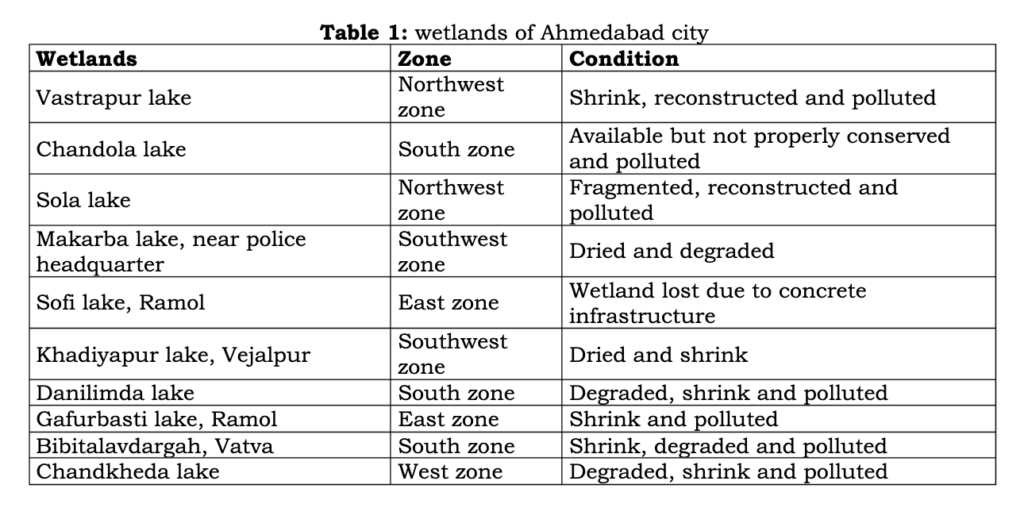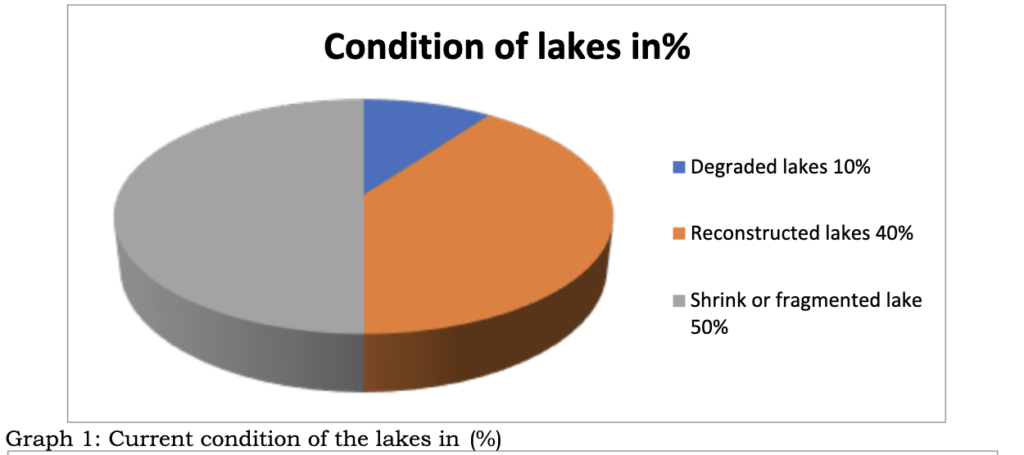degrading wetlands pose threat to ahmedabad’s ecosystem

Ahmedabad: Wetlands, often hailed as the most productive ecosystems globally, are facing a severe crisis in Ahmedabad, a commercial capital city of Gujarat, India. The rapid decline in the number and health of wetlands in the city has raised concerns among environmentalists and researchers. Wetland degradation is not just an environmental issue; it directly impacts catchment areas, disrupts the natural discharge of sewage, domestic and industrial wastewater, and exacerbates urban exploitation and pollution.
In the past, Ahmedabad has witnessed urban flooding impacting daily lives and livelihoods.
A recent study, “STATUS OF SELECTED WETLANDS IN AHMEDABAD”, focusing on the wetlands in Ahmedabad sheds light on the current state of these crucial ecosystems. The findings underscore the urgent need for effective wetland management.

As per the study, “Ahmedabad city had 630 lakes from total water bodies in the civic limits in 1999, which has now decreased to 122 big and small lakes. Since many water bodies were shallow they were excluded from the official list of a lake, and once these water bodies were not considered lakes they were available for development and construction.”

“Understanding the current condition of wetlands is crucial for their preservation. It provides a foundation for implementing measures that can mitigate the degradation and promote sustainable management practices,” says a leading environmental scientist.
One of the primary drivers of wetland degradation in Ahmedabad is urbanization. The expansion of the city has led to the conversion of water bodies into roads, buildings, and housing areas. Areas that were once home to vast lakes and thriving vegetation are now a stark contrast, facing the brunt of unchecked development.
According to researchers, “The condition of lakes like Chandola and Vastrapur has worsened, with some being reconstructed for decorative purposes, damaging natural vegetation in the process. Additionally, lakes in areas such as Chandkheda, Gafurbasti, and Danilimda are grappling with pollution caused by chemical waste, plastic waste, and sewage water,”
“The consequence of such pollution is evident in the form of algal blooms and the proliferation of invasive species like Pontederia crassipes,” added researchers in the report.

During a field survey conducted between 2012 and 2022, researchers observed a significant loss of water bodies, leading to increased temperatures. It is imperative to acknowledge the lack of public awareness regarding the importance of these water bodies. Many residents are uninformed about the critical role wetlands play in maintaining ecological balance and providing various ecosystem services.
Ahmedabad, being a megacity with a population of about 55,77,94, and divided into seven zones, faces a unique challenge due to its rapid urbanization. It is located near the Sabarmati River, adding to the ecological significance of its wetlands. Environmentalists are now urging the authorities to take strict measures for wetland conservation and management.
“We need to raise awareness among the public about the importance of wetlands and the role they play in sustaining life. It’s not just about preserving these ecosystems; it’s about securing a sustainable future for Ahmedabad,” emphasises an environmental advocate based in Ahmedabad.
To tackle the degradation of wetlands, experts are calling for the formulation and enforcement of special rules and regulations aimed at preserving these vital ecosystems. By fostering a sense of responsibility and awareness among the citizens, Ahmedabad can take steps towards a more sustainable and ecologically conscious future.
Share Your Urban Stories! Have insights on urban challenges or solutions? Submit your press releases on urban issues to urbanvoicesin@gmail.com. Let your voice shape the conversation and inspire change in our cities.
